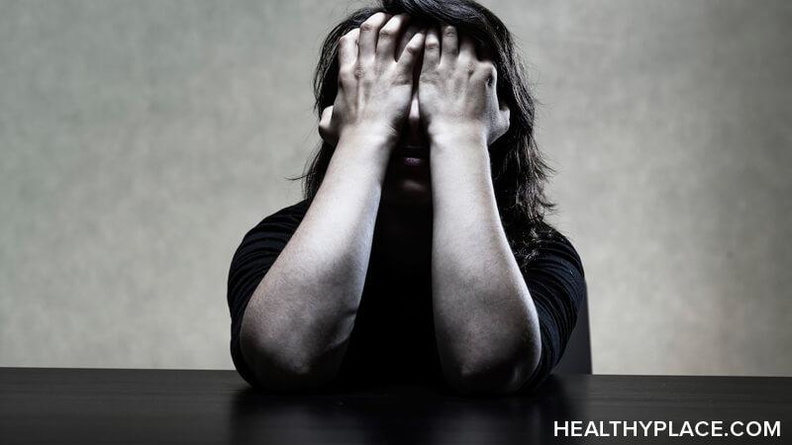How To Explain Trauma To People Who Don't Get It

So many times I've heard civilians say, "You mean, major trauma that leads to PTSD happens outside of the military?" The answer, of course, is a big, resounding, YES! The problem is that we don't have enough sources demystifying trauma and PTSD so that it's easy to see where it comes from and how it happens (Finding Meaning in Trauma and PTSD).
Have you ever heard about someone else's awful traumatic experience and thought that yours was inconsequential, or less awful? All too often we look at the experience of others and judge our own experiences against them. But that's fundamentally wrong. Just because your trauma may not, on the surface, appear "as bad" as someone else's doesn't mean it's any less traumatic or has less adverse effects.
Adding to this kind of thinking is the opinion of other people. Whether you're in a competitive support group where members try to outdo each other with horror stories, or you're surrounded by people who don't understand what trauma is, it's easy to feel devalued and invalidated by the comments of the world outside.
Explaining Trauma and PTSD Starts with Knowledge
Educating yourself about how to define trauma becomes critical in appreciating your own experience and recovery process, plus educating those around you. This week, I had a terrific conversation with Judy Crane, founder of The Refuge - A Healing Place, a treatment center for addiction, trauma and PTSD recovery. During our chat, Judy defined trauma down to a very minute level. I want to share it with you and hope that you'll share it with others so that we spread the word about what trauma really means.
What is Trauma?
 A trauma survivor herself, Judy first defined trauma as
A trauma survivor herself, Judy first defined trauma as
"anything less than nurturing."
Wow, that casts a wide net and repositions trauma from the exotic to the every day, which makes it much more accessible and ubiquitous. If you've ever felt like you're separate or disconnected from the world because of your trauma, the truth is that the world is full of it; you are very connected, indeed.
Judy then went on to deepen the definition by saying that trauma is
"an event or experience that changes your vision of yourself and your place in the world."
From this perspective, you (and anyone you share this info with) can see how easily trauma leaves its mark. Without your permission, a negative, frightening, hurtful or disempowering event occurs that shifts you into a place of feeling "less than". From here, it's a slippery slope to feeling unworthy, undeserving, purposeless and useless, the very feelings that contribute to posttraumatic symptoms and interrupt a normal life.
Explain Trauma & PTSD Simply; Others Will Get It
The next time someone (including you) poo-poos your trauma or PTSD experience or belittles the effects it's had on you, share Judy's simple explanations. You can say, for example,
Trauma is anything less than nurturing that changes your vision of yourself and your place in the world.
Explain, too, that trauma happens in both the big and little moments of how life negatively alters you.
From bullying to verbal abuse to abandonment and neglect, trauma comes in as many forms, shapes and sizes as the human race. That means experiencing trauma is part of the human condition. When you feel traumatized you are a normal, feeling, thinking being who has just had a perspective shift that can be shocking, startling, disconcerting and leave you feeling at a loss for how to respond.
Michele is the author of Your Life After Trauma: Powerful Practices to Reclaim Your Identity. Connect with her on Google+, LinkedIn, Facebook, Twitter and her website, HealMyPTSD.com.
APA Reference
Rosenthal, M.
(2014, January 1). How To Explain Trauma To People Who Don't Get It, HealthyPlace. Retrieved
on 2026, March 5 from https://www.healthyplace.com/blogs/traumaptsdblog/2014/01/feeling-misunderstood-how-to-explain-trauma-to-people-who-just-dont-get-it
Author: Michele Rosenthal
hunhun I understand this pain. It's awful, it's all consuming and soul destroying.
But at the other side of this turmoil is the problem that you are still here
To deal with it. So amongst the heartbreak and turmoil find a place for you.
Grip on to the kitchen bench, let the tears of confusion run out and remember
You to need to allow yourself a way to move forward. Cry loads, play all the music that lets you roll through those emotions. Then go to the ocean, or some nature near you and let it all go. The hurt, the sorrow, the confusion and the regret. And remember that you need to find a way forward and that in tide and time this feeling of hurt will pass. Your son, your very confused and frightened son would want you to go on. To have hope, to have love, but to most crucially a life without heartache. He is watching down on you. Make him proud
I deeply appreciate your post. I was in a group yesterday and shared an aspect of the effects of the trauma I have been through and one of the group members said something about how it's important not to get bogged down in self pity and get busy doing for others.... Wow, did I feel like I was in the wrong room. Fortunately I have given myself permission to feel my feelings and have been through years of healing and recovery or this would have triggered an episode, but PTSD is so isolating, I have found, because it seems like no one gets it.... But God.
PTSD is the most lonely thing to have.
Everything that you said resonated with me.
Only we know the startle response that keeps waking us during the night. We can't switch it off.
Everything looks bleak at 0300hrs.
It looks worse at 0400hrs.
Cue years of despair and thoughts of suicide at 0500hrs.
Only God is awake then too. Only He understands.
Only He is there to hold me. That's walking through the valley of the shadow of death.
So glad He's with me. I would have been dead long ago if not. (Violent assault and indecent assault and torture by a surgeon in Australia in 2011. Left me with nerve pain and damage, and nightmares, as you can all appreciate.)
I wish you all peace, comfort and healing.
That should say "cue TEARS of despair...", not "years".
Blasted autocorrect!
I have C-PTSD, not BP1 or Schizophrenia, but my biological mother (who I never met after my birth) had Schizophrenia and died in her early 40s. My heart goes to you. I think your son probably would hate that it's caused you so much anguish. The suffering he experienced was, I'm sure, so intense that he is at peace now. If he were here I imagine he'd hug you and offer you peace. I hope you do find that and I am so sorry for your tragic and painful loss.
Great piece! I'm always amazed by how many people truly have very little understanding of mental illness. It is such a common difficulty that many people face, and if society doesn't understand it, they will never be able to properly accept it either, or offer their support to loved ones who are mentally ill.
@Dagan -- Thanks so much for your feedback! As survivors we know on the inside what the truth really is, and isn't it a shame that others aren't always willing to listen? You're so right: if society doesn't embrace the facts then it can't offer proper support for survivors to heal. The age-old dilemma.... It's a good thing we all have each other. Very glad to have you here.
Michele, what's your stance on calling it a 'mental illness' as opposed to it being a natural response to unbearable events etc? Fine line, I know...
But if one could slightly distance it from mental illness, it may possibly receive a better reception from the general populace. Not very PC either I know, but people are starting to accept ptsd in soldiers. Starting... It'll be a long time before the meaning of the word cptsd is understood by general public, let alone what it actually entails and any ensuing empathy. So good on you for your work in getting it out there, Michele.
I once read the term mental injury - that seems more descriptive to me.
Having C-PTSD, this is the first time I've heard it described that way but yes. I always explain trauma feels like someone ran over me with a mack truck over and over and everyone around me is like "that wasn't a truck, a fly landed on your arm", or alternately, they don't want to feel unsafe either and they just look away. Maybe even sometimes both.
I agree re ‘injury’ rather than ‘illness’. Rings more accurately for m.
It is known as a mental illness because every part of the brain is over active especially the frontal and ocipital lobe and sometimes even the temporal lobe and central nervouse system.
frontal - emotional
ocipital- vision
nervouse system - sensory
temporal - visual memory and sensory
Because people do not understand PTSD is a Nuerological Emotional Dis.Ease induced by Trauma Only- that is curable- Non-Vetrans will not get the support nor therapy they need. Much like: The National Crime Center Registry in lack of funding. The Change You Choose website & the bi-weekly show available by professional counselers for those who can not afford it elsewhere or to be directed to a facility for those who can & all resources In-between is EPIC.
PTSD is a mental injury, not a mental illness. It is considered a disability covered by the Americans with Disabilities Act. We were injured just as a soldier who is brain injured, some people experience a permanent change in brain chemistry and automatic reactions to triggers. It is how we learn to cope with the triggers and character traits from the wounds inflicted on us that make us resilient enough to be productive working members of society or need disability support.